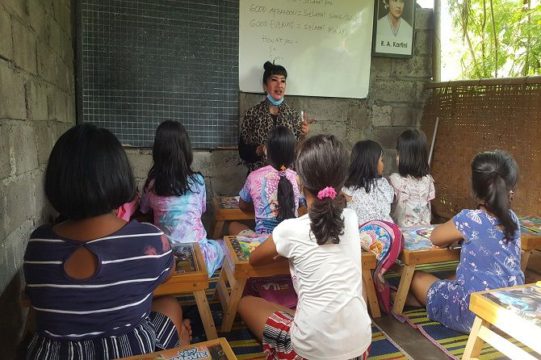RadarBali shares a story of acceptance, tolerance, and mutual assistance in its retelling of an emergency school established on the Buleleng River in North Bali.

Young children at play typically surround an extremely modest ramshackle shed measuring 4×2 meters with sounds emanating from the schoolhouse from English language classes underway provided without charge to area children.
Inside the shed, the teacher, Sisca Dharma De Panggabean (42), can be heard taking a group of eager pupils through the recitation of counting numbers, English salutations, and simple sentences. Residents say the English course offered by Sisca act as an irresistible magnet for the children of Banjar Bali in the area of Kalibaru and Tegal Mawar, North Bali.

The English class that commenced on Monday, 19 October 2020, has already managed to attract 60 children with lessons divided between five classes. The classes are divided into five categories: apple class for beginners. Depending on their English command, other students are spread across categories labeled mango class, strawberry class, jackfruit class, and more advanced learners, youth class. Each class category is limited to a maximum of 15 students.
All those participating in the class must follow strict health protocols to prevent the spread of COVID-19 that include hand washing and wearing masks. Children who cannot present a mask are given a spare mask without charge from “Ibu Guru” Sisca.
Sisca Dharma De Panggabean says she has taken on the job of teaching her group of 60 students English without pay because she sees the job as a special “calling.” During the continuing Pandemic, Sisca saw a large number of children idle and neglecting their studies. Parents who were too busy trying to meet their young families’ economic and dietary needs reluctantly allowed their children to roam free. At the same time, local schools were closed.
Sisca, who lives in the area, told how students and their parents would come to her home each evening asking for Internet access to follow online educational programs. Sisca also observes that many parents, confused by the online course material, lacked the patience to accompany their children in their studies.
Sisca says: “It was at that point that I began to think, how can help teach these children?”
With a self-taught fluency in English, Sisca decided to offer free-of-charge English lessons quickly filled by the youngsters eager to return to school.
Before embarking on the free course of study, Sisca presented her proposal to parents, community leaders, and local government officials. All gave a “thumbs up” to her desire to set up a local English course.
The simple 4 x 2-meter shed was named the Mami Sisca Centre. Financial support was organized from local donors who paid for furniture, books, stationery, a blackboard, and repairmen who knocked the shed into a more useable state.
On Monday, 16 October 2020, the first class commenced with an enthusiastic group of students in attendance. Delighted parents delivered students to their first day of English study. Some grateful children arrived at school with small gifts of chocolate and candies to share with Mami Sisca.
Observers report that a typical class modulates between moments of laughter and hilarity punctuated by periods of serious scholarship.
However, whenever frolicking students fail promptly to regain their focus, Sica quickly reclaims “good order” in the small classroom through the tactical use of her masterful baritone voice.
Baritone voice?
Hardly worthy of mention and of seeming no consequence to either her students and their parents is that Sisca Dharma De Panggabean is a member of Indonesia’s large transgender community who has made her home the small North Bali rural community.
“It’s called teaching children, and you need to be very patient. So far, the students always do as Mami tells them. This is because the student know me and have played near my house in the past,” explained Mami.
Sisca explained that the beginning apple class is attended by children aged 7-8 years, where children learn basic vocabulary. She targets to teach the mastery of five to seven new words to the beginning students each time a class meets.
The more advanced classes attended by older students achieve even more ambitious study goals. The most advanced level is the “youth class,” which is usually reserved for junior high school students and engages in simple conversation and dialogues in the English language.
“We hope that the students will eventually understand and be able to speak English. Sometimes tourists visit the area where they are invited to speak to the student to improve their comprehension skills,’ said Mami Sisca.
Fortunately, during the first two weeks of class, Sisca said she has encountered no significant educational obstacles. To supplement funding for the school, Sisca relies on income from performing Tarot Card readings. Eventually, however, she hopes an additional volunteer teacher will share teaching responsibilities.
Continuing, Sisca said: “Who knows, maybe there is a volunteer? I would happily receive their help. I plan to invite a university student from the English Faculty of Undiksha (Ganesha Teachers University) to help conduct our classes. If they could help run one or two classes, this would be a big help.”
One of Sisca’s students, Putu Zivara (8), is a grade school student from the Dana Punia Grade School in Singaraja. Putu says he enjoys studying English at the Mami Sisca Centre because “the teacher is good.”
Zivara’s parent, Dwi Handayani, supports the educational initiative started by Mami Sisca and is pleased to bring her child to and from the modest schoolhouse each day. Dwi prefers Sisca’s English classes to alternatives available online.

